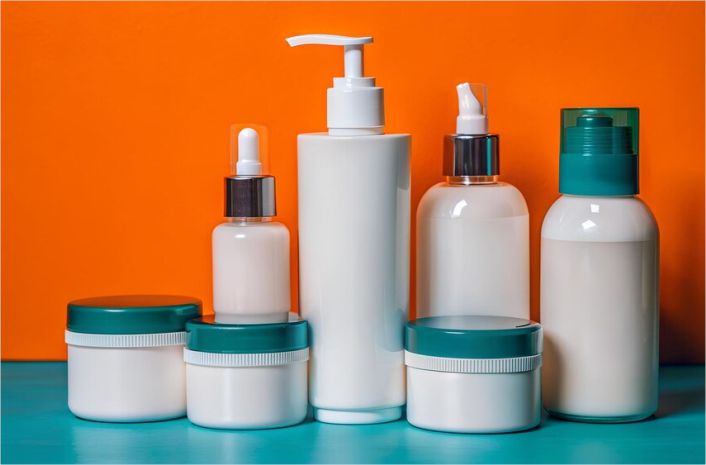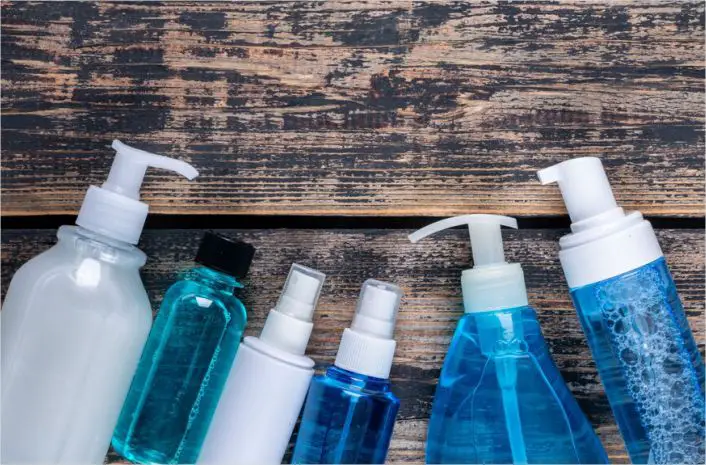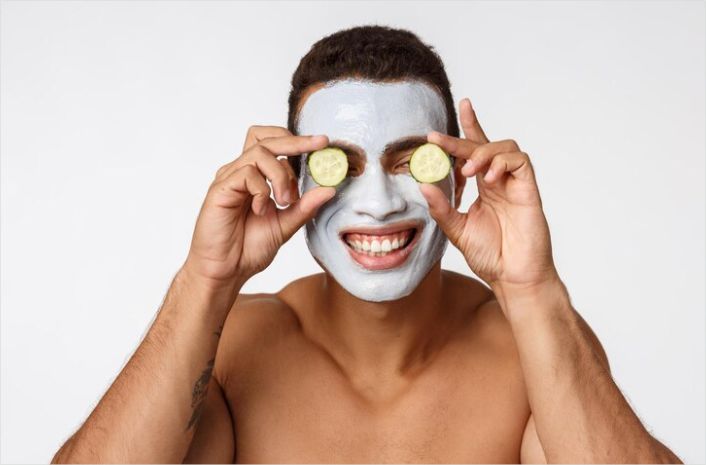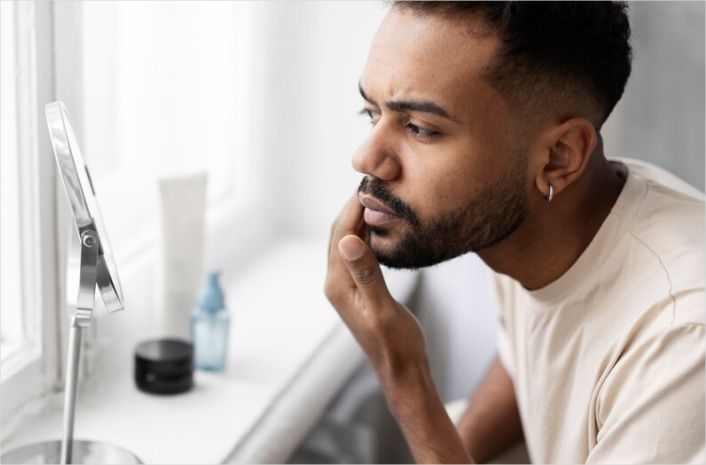Last updated on November 14th, 2025 at 02:05 pm
Avoid common skincare mistakes men make and learn essential tips to improve your skincare routine and keep your skin healthy.
Skincare is just as important for men as it is for anyone. Yet, many skip a skincare routine or don’t give it the attention it needs.
Your skin protects you from harmful elements, and when neglected, it can lead to dryness, irritation, and early signs of aging.
Taking care of your skin not only helps you look better but can also boost your confidence.
In this post, we’ll break down common skincare mistakes men make and share easy ways to fix them.
By tailoring a skincare routine to your needs, you can enjoy healthier skin and feel good about your self-care habits.
Here are skincare mistakes men make:
Mistake 1: Skipping Sunscreen

One of the most common skincare mistakes men make is skipping sunscreen.
It’s easy to overlook its importance, but sunscreen is a must for protecting your skin from harmful UV rays.
According to the NHS UK, sunburn increases your risk of skin cancer.
These rays can cause premature aging, like wrinkles and age spots, and even more serious issues such as skin cancer.
No matter the weather or how much time you plan to spend outdoors, sunscreen should be part of your daily routine.
The Myth About Sunny Days
A lot of men think sunscreen is only needed on sunny days, but UV rays can reach your skin even when it’s cloudy.
They can penetrate clouds or bounce off surfaces like water and pavement, meaning protection is always necessary.
It’s important to apply sunscreen regularly, not just when the sun’s out.
Choosing the Right Sunscreen
Choosing the right sunscreen can make a difference. Look for a broad-spectrum sunscreen with SPF 30 or higher to protect against both UVA and UVB rays.
While higher SPF can provide extra protection, the key is to apply it consistently.
How to Apply Sunscreen Effectively
To get the most from your sunscreen, apply it generously to all exposed areas of your skin at least 15 minutes before heading outdoors.
Don’t forget to reapply every two hours, or right after swimming or sweating.
Making this a habit will help protect your skin long-term.
Related Posts
Face Care Tips Men Should Not Ignore
Advanced Skincare Recommendations for Men
Anti-aging Haircare Products for 60-plus Men
How to Avoid Razor Bumps after Shaving
Best Skincare Products Men Should Consider
Skincare Mistakes You Should Not Make
Mistake 2: Over-Washing or Under-Washing

When it comes to skincare, finding the right balance is key.
Many men either over-wash or under-wash their faces, and both can harm their skin in different ways.
The Dangers of Over-Washing
Over-washing happens when you cleanse your face too often or use harsh products.
This strips your skin of its natural oils, leaving it dry, irritated, and vulnerable to environmental damage.
Over time, this can weaken your skin’s barrier, leading to long-term issues.
The Risks of Under-Washing
On the other hand, not washing your face enough can lead to dirt, oil, and impurities building up on your skin.
This can clog your pores, trigger breakouts, and worsen conditions like acne.
Plus, not removing sweat and pollution can speed up aging and dull your complexion.
Finding the Right Cleansing Routine
The key is balance. Your type of skin will help determine how often you should wash your face.
If you have oily skin, you might need to cleanse twice a day with an oil-control cleanser.
For dry or sensitive skin, a gentler cleanser once a day, or every other day, may be enough.
Mistake 3: Not Using Moisturizer

A common myth in men’s skincare is that oily skin doesn’t need moisturizer.
This can lead to dryness, overproduction of oil, and poor skin health. No matter your skin type, hydration is key.
Moisturizers help lock in moisture, create a protective barrier, and nourish the skin.
Why Your Skin Still Needs Moisture
When your skin lacks moisture, it often produces more oil to compensate, which can make oily skin worse.
Proper hydration also helps reduce fine lines and wrinkles, giving your skin a fresher, younger appearance.
Plus, moisturizers can address skin issues like acne, enlarged pores, and dryness.
Choosing the Right Moisturizer
The right moisturizer depends on your skin type.
For oily or acne-prone skin, go for non-comedogenic products that won’t clog your pores.
Lightweight gels or oil-free lotions hydrate without making your skin greasy.
If you have dry or sensitive skin, look for creams with ceramides or hyaluronic acid to provide deeper hydration without irritation.
Mistake 4: Using Harsh Products

A lot of men turn to harsh skincare products like strong soaps or alcohol-based aftershaves, thinking they’re the best way to clean and refresh the skin.
However, these products can do more harm than good. As reiterated by Livara, Harsh soaps strip away natural oils, leading to dryness and irritation.
Over time, this can weaken your skin and cause issues like eczema or dermatitis.
Why Alcohol-Based Aftershaves Aren’t the Best Choice
Alcohol-based aftershaves may feel cool and clean, but they dry out your skin.
While they dry quickly, they also leave your skin parched and irritated.
The more you use these products, the more your skin can struggle to maintain its barrier, leading to oil overproduction, breakouts, and ongoing irritation.
Choose Gentler, Skin-Friendly Alternatives
To build a healthier skincare routine, switch to gentler products that hydrate and nourish your skin.
Look for soaps and cleansers labeled “moisturizing” and “sulfate-free” to avoid harsh chemicals.
For aftershave, choose alcohol-free options with soothing ingredients like aloe vera or chamomile.
These products will calm and hydrate your skin without causing irritation or dryness.
Mistake 5: Ignoring the Eye Area

The skin around your eyes is thinner and more delicate than the rest of your face, yet it often gets overlooked in skincare routines.
Skipping this area can lead to dark circles, puffiness, and signs of aging.
Many men make the mistake of using regular moisturizers around the eyes, but these aren’t formulated for the unique needs of this sensitive skin.
Why You Need Eye Cream
Standard moisturizers can irritate the delicate skin around your eyes or fail to target specific concerns.
Eye creams, on the other hand, are designed to tackle puffiness, fine lines, and dryness.
Look for products with ingredients like peptides, caffeine, or hyaluronic acid, which help hydrate and reduce the appearance of dark circles and puffiness.
How to Apply Eye Cream
The way you apply eye cream matters. Instead of rubbing it in harshly, use a gentle tap-and-dab method with your ring finger to avoid putting stress on the skin.
This ensures the cream absorbs properly and prevents irritation.
By adding eye cream to your skincare routine, you can reduce puffiness and fine lines, giving you a refreshed, youthful appearance.
Taking care of this area shows that you’re paying attention to every part of your grooming.
Mistake 6: Lack of Consistency
A common mistake many men make is not sticking to a consistent skincare routine.
Skincare isn’t a quick fix, it’s an ongoing process. When you skip steps or use products sporadically, you miss out on the long-term benefits.
Why Consistency Matters
To see real results, you need to make skincare a regular part of your routine.
Whether your routine is simple or more involved, consistency is key. A few basic steps, like cleansing, moisturizing, and applying sunscreen daily, can go a long way in improving skin health.
The goal is to make these steps as automatic as brushing your teeth.
The Power of Routine
Skin improvements don’t happen overnight, and that’s okay. Over time, you’ll notice smoother texture, fewer wrinkles, and clearer skin if you stick to your regimen.
For example, a good moisturizer hydrates your skin, but if you don’t use it regularly, you won’t see the results you want.
Mistake 7: Not Paying Attention to Diet

When it comes to skincare, many men focus solely on the products they apply, ignoring the role diet plays in skin health.
But the truth is, what you eat has a direct impact on how your skin looks and feels.
The Link Between Diet and Skin Health
Your skin is the body’s largest organ, and it needs proper nutrition to stay healthy.
Foods packed with vitamins, minerals, and antioxidants can help keep your skin glowing and address issues like dryness, acne, and premature aging.
For example, vitamins A, C, and E, plus omega-3 fatty acids, are all vital for skin hydration and repair.
Key Nutrients for Healthy Skin
Incorporating fruits, vegetables, nuts, and fatty fish into your meals can provide your skin with the nutrients it needs.
Hydration is also key, drinking plenty of water keeps your skin moisturized and maintains its elasticity, preventing flakiness and sagging.
Avoid Processed Foods
Too much sugar and processed food can lead to skin inflammation and worsen acne.
Choose whole grains, lean proteins, and fresh produce to keep your skin looking clear and healthy.
Probiotics and fiber-rich foods are also beneficial for gut health, which shows up on your skin.
Lifestyle Choices Matter
Diet isn’t the only factor to consider. Things like smoking and excessive alcohol consumption can harm your skin’s appearance, too.
A balanced, nutrient-rich diet, paired with proper hydration, is a holistic approach that supports both internal and external skin health.
Mistake 8: Not Adjusting to Changing Skin Needs

As you age, your skin changes. It’s important to recognize that the skincare routine that worked in your younger years may not be as effective as you get older.
Hormonal shifts, age, and environmental factors all influence your skin, and sticking to an outdated routine can cause unnecessary issues.
How Age Affects Your Skin
As you get older, your skin tends to become drier and loses some of its resilience.
This calls for hydrating products and extra protection. A moisturizer that worked in your 20s may not cut it anymore.
You’ll need more nourishing ingredients to keep your skin smooth and hydrated as it loses moisture over time.
Consider Your Environment
The climate where you live can also affect your skin’s needs. For example, what worked in a humid area might cause breakouts or make your skin too oily in a dry climate.
It’s essential to adjust your skincare routine based on your environment.
Temperature, humidity, and pollution all play a role in how your skin reacts.
Regular Skin Checkups
To keep up with your skin’s needs, take a moment to assess its condition regularly.
Look at its texture, hydration levels, and any new concerns like sensitivity or fine lines.
If you notice changes, adjust your routine to address them.
For example, switch to richer creams in winter to lock in moisture, and lighter products in the summer to avoid clogging pores.
Adapt to Skin Changes
Skincare is not a one-size-fits-all approach. As your skin’s needs evolve, so should your routine.
Stay flexible and make adjustments based on age, environment, and seasonal changes to maintain healthy, vibrant skin throughout the years.
By staying proactive, you’ll keep your skin looking its best at every stage of life.
Frequently Asked Questions
How often should I wash my face?
Wash your face twice daily, morning and night, to remove dirt and oil without over-drying your skin.
Can I skip sunscreen on cloudy days?
No. UV rays can still reach your skin on cloudy days, so always apply sunscreen for protection.
Do moisturizers help oily skin?
Yes, moisturizers prevent oil overproduction by balancing hydration, even for oily or acne-prone skin.
How does diet affect my skin?
A nutrient-rich diet with vitamins and omega-3s supports skin hydration and helps reduce acne and aging.
Conclusion
Skincare is an ongoing commitment that adapts to your skin’s changing needs over time.
By avoiding common mistakes such as skipping sunscreen, over-washing, or neglecting moisturizer, you’ll maintain healthier, smoother skin.
Regularly assess your skin and adjust your routine to cater to age, environmental factors, and seasonal changes.
The right products, combined with a consistent routine, will ensure you look and feel your best, no matter your age.
Pyo Merez is a men’s lifestyle enthusiast and writer about the gentleman’s place and impact on society. Raised by a distinguished gentleman dad, he offers unique insights into how the mind of a gentleman works and how societal norms shape gentlemen’s identity and vice versa.
Through his insightful articles, Pyo taps into the depths of gentleman culture to provide perspectives on etiquette and manners in modern society.

